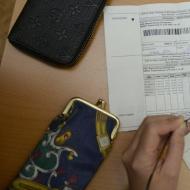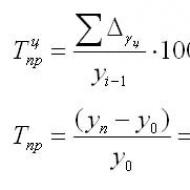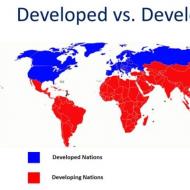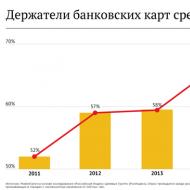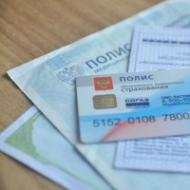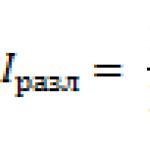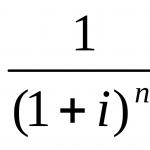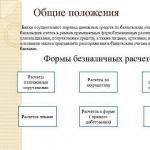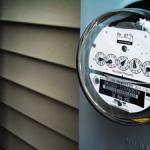
Choosing a tax system for homeowners' associations. What taxes does the HOA pay and which system is more profitable? Download tax return forms
The issue of providing utility services is not yet clearly regulated by law; owners of apartments in high-rise buildings are allowed to manage the house themselves or with the help of hired organizations. For self-government, citizens are organized into a homeowners' association, which, as a legal entity, is obliged to pay taxes. Either an accountant or the chairman of the board is responsible for tax reporting. This rightfully raises the question - what taxes does the HOA pay?
Grounds for paying taxes
Although the HOA is a non-profit organization, it still has an obligation to pay taxes to the treasury. Tax authorities believe that all funds received into the partnership account are income and, therefore, are subject to taxes. After all, a partnership is an economic entity that makes profit from a certain activity. But not all HOA activities are commercial, which is why confusion arises about which types of activities pay a bribe and which ones do not.
Until now, tax legislation is being adjusted by the Ministry of Taxes and Duties. Issues related to the activities of HOAs are also explained.
For example, it is explained that if a partnership has entered into an agreement for the supply of utilities, then the money deposited by residents into the HOA account, from which it is then transferred to suppliers, is not subject to fees, because suppliers are required to pay them from their profits.
The Tax Code explains that legal entities providing housing to citizens are exempt from paying taxes. But the activity of maintaining housing is taxable.
Utility payments are targeted funds that go to pay for the services of resource providers. At the same time, by paying for the work of hired workers, for example, janitors or the same accountant, it turns out that the HOA provides services to itself, therefore, fees for these services should be subject to taxes, like payments to suppliers. However, the legislator recognized this money as targeted expenses, because the HOA does not make a profit from paying itself.
Not all tax authorities recognize this position, as a result of which partnerships have to seek tax breaks in the courts. Judicial practice shows that partnerships often win tax cases, therefore there is no need to be shy about going to court to win back tax burdens from utility bills.
So on what funds is the partnership required to pay taxes? Taxable activities include:
- rental of premises or common property of the house;
- easements;
- rental of space for advertising stands;
- Internet service provider fees, etc.
HOA taxation system
There are three types of taxation systems:
- general;
- simplified (income tax);
- simplified (income minus expenses).
To correctly select the application of the partnership taxation system, it is necessary to conduct an accounting analysis, for which you need to compare the estimates of income and expenses of the HOA. Tax on income under the simplified system is paid regardless of what expenses the partnership has incurred.
 The simplified taxation system “income minus expenses” for HOAs is the most optimal, since it allows you to significantly reduce the tax base by including utility payments in the cost estimate.
The simplified taxation system “income minus expenses” for HOAs is the most optimal, since it allows you to significantly reduce the tax base by including utility payments in the cost estimate.
Currently, almost all cooperatives use the “simplified” system, because according to the general taxation system, HOAs are required to pay the following types of taxes:
- income tax;
- Personal income tax (including deductions from wages of employees to funds - paid according to any taxation system);
- transport tax (if the HOA does not own transport, the rate is zero);
- unified social tax.
When switching to the “simplified” system, the partnership legally bypasses all these taxes. You can switch to the simplified tax system immediately upon registration of the HOA or in October of any year.
Income tax is a deduction only on business income! Target payments by residents should not be included in the tax base. Targeted payments include not only contributions for resources transferred under service agreements, but also contributions for major repairs. If tax authorities demand payment of a levy on earmarked funds, there is a direct path to court to defend your rights!
Lazy HOA
 The natural question is “a lazy HOA – what is it?” When you mention this term, you probably imagine an inert concrete (or brick) creature. In essence, this is how it is. In a lazy HOA, reporting, as well as the general management of an apartment building, is handled by a hired management company, and the partnership has only one goal - to control the activities of this company.
The natural question is “a lazy HOA – what is it?” When you mention this term, you probably imagine an inert concrete (or brick) creature. In essence, this is how it is. In a lazy HOA, reporting, as well as the general management of an apartment building, is handled by a hired management company, and the partnership has only one goal - to control the activities of this company.
If in a “full” partnership an agreement for the supply of resources (in writing or in fact) is concluded with each owner, then the lazy partnership is the only customer of services. The advantages of such an HOA are that when resolving conflict situations with the management office, activity is required not from a specific resident, but from the partnership, whose authority is undoubtedly more significant.
It is easier for the partnership to request a report from the manager on the work performed, check the readings of the common building meters or the correctness of payment calculations. If the report is not satisfactory, the HOA may hire an independent auditing firm to review the flow of finances.
A lazy HOA can easily break the contract with one management company and look for another, more remarkable one for itself. This requires only a decision of the general meeting, which can be held at any time. For the benefit of apartment owners, competition between management companies is increasing.
At the same time, managers, by hook or by crook, are trying to deprive the partnership of its legal rights, “pushing” management agreements for signing with such conditions that the management of the HOA does not have influence on financial control activities.
But at the end of 2014, the President signed a law that established administrative liability for failure to provide information in the management of apartment buildings. So partnerships have a powerful tool for debugging control over housing and communal services!
A housing organization has the right to choose a taxation system upon creation or during its activities every calendar year. A simplified calculation system involves calculating the amount of tax payment at a rate of 6% of all income of the organization or at a rate of 15% of income reduced by the amount of expenses.
Important! For housing associations that want to switch to a simplified tax payment system, it is possible to switch only to that version of the system in which expenses are deducted from income, and the tax rate is equal to 15 percent (clause 3 of Article 346.14 of the Tax Code of the Russian Federation).
Among the main advantages of the simplified system for HOAs are:
- Exemption from VAT.
- The ability to reduce the tax base when new residents of the house join the partnership.
- Possibility to exempt from taxes the profits of a housing association arising as a result of economic activities.
- The possibility of maximizing the amount of taxes paid by leveling the income-expense difference.
It is possible to reduce the difference between the income and expenditure side regardless of the size of the net income side, which is a significant advantage for large housing structures.
The disadvantages of the simplified system in relation to housing associations include:
- The need for additional accounting operations for correct balance of accounts.
- Growth of the tax base with increasing debt of the organization.
The tax base may also grow in cases where individual residents enter the HOA when they sign contracts with the board for the full use of internal services for repairs and maintenance of housing, since in this case, payment for such services will be included in the income of the housing association.
This is especially sensitive for small HOAs (up to 50 apartments).
What are the income and expenses of an HOA?
In a simplified method of calculating the amount of tax, income includes the following types of cash receipts:
- Proceeds from the sale of property.
- Subsidies from the municipality.
- Acquisition by the board of property rights to real estate.
- Payment of receipts for utilities and repairs of common premises from residents who have not joined the HOA.
- Payment for services organized by the housing association, apartment owners who have not joined it.
Reference! Membership, entrance and other fees of tenants-members of a housing association are not included in the income part under the simplified method of taxation, since these contributions are considered targeted income (clause 1 of Article 251 of the Tax Code of the Russian Federation).
In order for the contributions of residents belonging to the organization to be considered targeted, it is necessary to describe the structure of such contributions in the annual budget.
The following financial receipts are also not included in the amount of income:
- Contributions to the reserve fund.
- Payment according to receipts for major repairs.
- Sponsorship and charity.
- Free services provided.
- Income from business activities.
- Administrative.
- Technical and repair.
- Other.
Administrative expenses include expenses for the maintenance of the management apparatus of the HOA, as well as office premises for permanent full-time employees.
This includes expenses for salaries of employees, maintenance of premises, etc.
Technical expenses include expenses for repairs and maintenance of common property.
Important! With a simplified tax policy, housing association expenses incurred within the framework of statutory activities are not taken into account.
The list of expenses by the amount of which the tax base is reduced only takes into account:
- Expenses that go beyond the approved target estimates.
- Material costs.
- Salaries for employees.
- Internal overhead costs.
- Insurance costs.
It must be taken into account that Under the simplified tax system, the statutory goals are considered to be the maintenance and repair of common property, as well as the provision of utilities by the HOA without taking into account possible hired labor.
How and in what documents should it be reflected?
The income and expense components of the financial activities of the HOA must be reflected in the following documents:

The preparation of annual income and expenditure estimates is the responsibility of the board of the housing association, and the approval of such estimates falls within the competence of the general meeting of residents (Part 3 of Article 148 of the Housing Code of the Russian Federation).
Internal accounting documents are filled out by an accountant and must contain entries (or account assignments) corresponding to each transaction of receipt or expenditure of funds.
Accounting for Income and Costs
With a simplified tax calculation system, it is important to separate funds received as payment for services from members of the HOA and from residents who have not joined the organization; this is done using entries D 86 and K 26.
Other entries that allow you to take into account basic income and expenses include:
- Receiving subsidies – D55 and K50.
- Expenses for repair work – D20 and K60.
- Receipt of contributions – D76 and K86.
- Payment on receipts for special services of non-HOA members – D76 and K60.
- Expenses for payment of services of suppliers – D91 and K60.
- Tax calculation when using the simplified tax system - D26 and K68.
- Profit from renting out premises – D62 and K90.
If there is no separate accounting, then all receipts are considered income on which taxes must be paid.
Important! To exclude profit from business activities (including rental of premises) from the total amount of income under the simplified tax system, you need to use entries D84 and K86, which transfer commercial profit into funds for targeted financing.
Reporting
With a simplified system, the accounting department of a housing association reports income and expenses in the following ways:
- Drawing up a report for submission to the auditor and housing inspection authorities.
- Filling out a tax return.
The report for regulatory authorities must reflect the following information:

The report must be submitted to the auditor and the annual general meeting of owner-members of the HOA. The source of information for generating the report is the accounting ledger and regular payroll records.
Filling out the declaration
The tax return of a housing partnership under the simplified tax system must be filled out in accordance with the form approved by Order of the Tax Service No. 7-3-99. The text of the declaration must contain the following information:
- Name of the HOA.
- Taxable period.
- Details of the partnership as a legal entity, incl. banking.
- Name and code of the tax office where the information is provided.
- Code of activity of the partnership according to the classifier.
- The amount of advance payments received as of the date of filing the declaration.
- The amount of tax payable, minus advance payments.
Attention! With a simplified calculation scheme, the tax is calculated independently by the accounting staff of the housing association, but the tax service has the right to initiate a verification of the calculation data by requesting the necessary payment documents from the board.
Due dates
The completed declaration must be submitted by the responsible person no later than the end of March of the year following the reporting year, in accordance with Part 1, Clause 1, Art. 346.23 Tax Code of the Russian Federation.
 When liquidating a housing association, it is necessary to submit a closing reporting declaration to the tax service no later than the 25th day of the month following the month of liquidation of the housing structure (clause 2 of Article 346.23 of the Tax Code of the Russian Federation).
When liquidating a housing association, it is necessary to submit a closing reporting declaration to the tax service no later than the 25th day of the month following the month of liquidation of the housing structure (clause 2 of Article 346.23 of the Tax Code of the Russian Federation).
The date of submission of internal reports of the housing association is determined by the charter and the general meeting of residents-members of the organization, as a rule, such reports are presented in early January or late December at the annual meeting of property owners.
So, a simplified tax assessment system can reduce the taxation expenses of a housing association, provided that the organization of residents is large enough and the majority of residents of houses entrusted to the HOA are its members. If there are significant debts of residents (more than 10% of assets) in the housing structure, it is better to use a common payment system.
The norms of the Tax Code of the Russian Federation provide the taxpayer with the right to choose between different taxation systems. In this case, the organization can follow the path of paying tax payments under the general taxation system (OSNO) and under the simplified taxation system (STS).
With OSNO
When the management of a company decides to pay mandatory payments provided for by the general taxation system, it should be guided by:
So, Any HOA may have a taxable base for the following taxes:
- income tax;
- value added tax;
- property tax;
- land tax;
- transport tax;
- National tax;
- insurance premiums.
At the same time, by paying wages to employees, the partnership will act as a tax agent for calculating, withholding and transferring personal income tax to the budget.
With simplified tax system
The transition of an organization to a “simplified” system involves the payment of one payment, calculated as a percentage of income (6%) or profit (15%), in lieu of the transfer of the following taxes:
- at a profit;
- on property;
Attention! The remaining mandatory payments are subject to payment on a general basis in accordance with the legislation of the Russian Federation.
How much should the partnership pay and when?
The calculation procedure, deadlines for payment and reporting, as well as the specifics of each tax are discussed below.
From profit
The object of taxation is directly the amount of profit received by the organization, which in a general sense is the amount of income minus the expenses of the enterprise. In this case, the tax base is calculated as the monetary expression of the profit generated at the end of the reporting period.
The amount of payment is determined as a percentage of the amount of profit:
- 3% in favor of the federal budget;
- 17% goes to the budget of the federal subject.
The HOA must calculate, remit income tax and submit a declaration to the tax authorities on a quarterly basis.
Among the income that an HOA can receive, the following types can be distinguished::
- Entry fees.
- Payments by owners who are not members of the HOA.
- Income from intermediary activities.
- Receipts from the provision of public services.
- Targeted financing, etc.
In turn, expenses may include:
- Maintenance of local lands.
- Settlements with suppliers of water and electricity.
- Current modernization.
- Management expenses.
Important! Not every type of income should be included in the calculation of the taxable base. In order to prevent overpayment, you should be guided by Article 251 of the Tax Code of the Russian Federation, which discloses the list of income that is not subject to taxation.
Among them is the property received as targeted financing. In particular, these are funds received for repairs and major overhauls from the budget, as well as from members of the organization.
VAT
The object of this tax is the sale of goods, works, services. Since the activities of the HOA are not related to the production of products or the purchase and sale of goods, in this case we should consider exclusively the implementation of works and services, such as:

Considering that, as a rule, the obligation to provide the above services on one’s own behalf and at the expense of HOA members is stated in the organization’s Charter, such transactions are exempt from VAT.
In this case VAT should only be applied to fees under intermediary and agency agreements. The tax rate is 18%, tax payment is made monthly, and reports are submitted quarterly.
For property
The need to calculate this payment arises for an organization if it has movable or immovable property on its balance sheet. The average annual or cadastral value of such property is taken as the tax base. Tax rates are fixed by the laws of the constituent entities of the Russian Federation and cannot be higher than 2.2%.
As for an apartment building, its owners are recognized as residents. Accordingly, payment of property tax falls on their shoulders and is not the responsibility of the HOA.
An HOA acquires the status of a property tax payer only when it acts as the owner of any other property, including vehicles.
Transport
Having vehicles on its balance sheet, the partnership enters into relations with the budget regarding the payment of not only property tax, but also transport tax.
The tax base is determined based on the engine power level. Tax rates are established by the laws of the constituent entities of the Russian Federation depending on the technical characteristics of the vehicle.
Payment and submission of tax returns is carried out annually.
Land
 Land plots are recognized as the object of taxation. Land tax is calculated as a percentage of its cadastral value.
Land plots are recognized as the object of taxation. Land tax is calculated as a percentage of its cadastral value.
In the context of considering the procedure for calculating and paying tax payments by a homeowners’ association, it is important to note that land plots from the common property of an apartment building are not included in the list of taxable objects.
The site, which is intended for individual housing construction (IHC), must be located in an appropriate place.
From wages
The legal framework of Russia involves the payment of two types of taxes related to the payment of labor to individuals:
- Insurance premiums.
- Personal income tax (NDFL).
Insurance premiums are paid directly by the organization from its own funds. The total contribution rate is 29%, of which:
- 22% goes to pension insurance;
- 2.9% - in case of temporary disability and in connection with maternity;
- 5.1% - for compulsory health insurance.
At the same time, payroll tax must be paid monthly and reported to the tax authorities quarterly.
In its turn, Personal income tax is not a tax that must be paid by an HOA or any other enterprise from its own funds, since taxpayers are recognized as individuals. However, the obligation to calculate, withhold from employee income and transfer this payment to the budget rests with the employer as a tax agent.
The tax rate generally applied is 13%. An exception, for example, is the income of foreign citizens, for whom the rate is set at 30%.
The tax base is defined as the monetary value of an individual’s income minus benefits and deductions. Payment is made monthly, calculations are provided by the employer quarterly.
Reference! In addition to the listed taxes, the HOA may also pay a state fee for carrying out legally significant actions. The need to pay a fee is not related to the direct activities of the partnership.
Which tax system should you choose?
 In order to decide on the type of tax system, it is necessary to determine whether the organization is suitable for the transition to paying taxes under a simplified system:
In order to decide on the type of tax system, it is necessary to determine whether the organization is suitable for the transition to paying taxes under a simplified system:
- the amount of income for 9 months should not exceed 112.5 million rubles;
- the residual value of fixed assets does not exceed 100 million rubles;
- the average number of employees is no more than 100 people;
- the share of participation of other enterprises in the authorized capital does not exceed 25%.
The choice of one tax system or another is the most important management decision. To make such a decision, you should evaluate the results of the organization’s economic activities, calculate the projected amounts of income and expenses for the coming period, as well as the expected amounts of tax liabilities under the general taxation system and under two options for the simplified system (with the withdrawal of 6% from income, as well as 15% from the amount of income minus expenses).
The system that provides the lowest tax costs, as well as costs, including labor, for the preparation and submission of reports should be taken as the basis.
How can I deposit money?
There are various ways to deposit money to pay taxes, including:
- through the Internet;
- through an ATM;
- through the cash register, etc.
Previously, a rule was established for legal entities that did not allow them to pay taxes in cash. Transfers were allowed only from a current account registered with the HOA.
Currently, you can pay taxes for a legal entity in cash without using a current account. This can be done by an individual if there is a power of attorney or by the head of an organization who has the right to act on behalf of the HOA.
What to do to get money into the budget?
 In order for tax payments to reach the budget, the following actions must be taken::
In order for tax payments to reach the budget, the following actions must be taken::
- Calculate the amount to be paid.
- Open a current account with a bank that provides cash and settlement services.
- Compose a payment order indicating the amount and the recipient’s account.
Considering the extensive list of taxes that an HOA must pay, as well as the many nuances, specifics of calculation and liability for late payment or incomplete payment of taxes, such a matter should be entrusted to a competent specialist.
In this case, the accountant may be entrusted not only with the responsibility of conducting relevant affairs, but also with choosing the taxation system and method of paying tax payments. The financial stability of the organization may depend on making the right decision (to pay income tax, VAT, property tax or payment provided for by the simplified taxation system).
Taxation of housing cooperatives (HOA) in questions and answers
According to the law, a homeowners' partnership (HCP) is recognized as a non-profit organization, an association of owners of premises in an apartment building for the joint management of a complex of real estate in an apartment building.
On January 1, 2005, Federal Law No. 188-FZ dated December 29, 2004 introduced the Housing Code of the Russian Federation. The activities of HOAs are regulated by the Housing Code, Federal Law dated June 15, 1996 No. 72-FZ “On Homeowners' Associations.” These organizations can exist in the form of a partnership, consumer cooperative or non-profit partnership (non-profit organization). Funds received from HOA members as obligatory payments are targeted financing.
The main types of cash receipts of housing cooperatives are:
Entry fees are funds periodically contributed by members of a non-profit association to pay for the labor of employees who have entered into employment contracts;
Targeted contributions - funds contributed by members of a non-profit partnership or non-profit partnership for the acquisition (creation) of public facilities;
Share contributions - property contributions made by members of a consumer cooperative for the acquisition (creation) of property for common use;
Additional contributions are funds contributed by members of the consumer cooperative to cover losses incurred during the implementation of activities approved by the general meeting of members of the consumer cooperative.
What taxes do you need to pay? Are there special simplified options?
Profit TAX is not paid on targeted income received free of charge for the maintenance and conduct of the statutory activities of the HOA, which includes entrance and membership fees of HOA members.
If, in accordance with the Charter, the HOA is entrusted with the responsibilities for the operation of a residential building and the surrounding area, the provision of other services (work), and the HOA, on its own behalf, enters into contracts with suppliers of these services (work), acting on behalf of and at the expense of members of the HOA, that is, in fact, is an intermediary, then income tax will be levied only in relation to the intermediary, agency or other similar remuneration of the HOA.
In addition, when providing HOA services, value added tax should be calculated in accordance with the generally established procedure. With regard to VAT, the legislation does not provide for special benefits for homeowners' associations.
Also, the homeowners' association pays a single social tax and property tax in the generally established manner.
But all these taxes can be avoided if the HOA, subject to compliance with all the requirements of the Tax Code, applies a simplified taxation system.
In this case, all of the above taxes will replace the tax calculated based on the results of the HOA’s economic activities (6% of income or 15% of income, reduced by the amount of expenses), and deductions of 14.2% from employee wages. If, upon registration, you do not immediately submit an application for transfer to a simplified taxation system, then this will only be possible starting next year, and the application will need to be submitted between October 1 and November 30.
Also, in any case, the partnership is obliged to withhold and transfer to the budget tax on income paid to individuals hired by the HOA. Accordingly, the HOA must keep records of the income of individuals, and annually, no later than April 1, submit information on the income of individuals in Form 2-NDFL to the tax authorities.
For reference
Simplified taxation system
Letter No. 22-0-10/1986@ of the Federal Tax Service of Russia dated December 28, 2004 communicated the resolution of the Presidium of the Supreme Arbitration Court of the Russian Federation dated October 12, 2004 No. 3114/04 on the legality of the application of the simplified taxation system by non-profit organizations.
The transition to a simplified taxation system or a return to the general taxation regime is carried out voluntarily by organizations and individual entrepreneurs in the manner prescribed by the Tax Code of the Russian Federation.
In accordance with paragraph 2 of Article 346.11 of the Tax Code of the Russian Federation, the use of a simplified system of taxation by organizations provides for the replacement of the payment of corporate income tax, corporate property tax and the unified social tax with the payment of a single tax calculated based on the results of the economic activities of organizations for the tax period.
These organizations are not recognized as taxpayers of value added tax payable in accordance with the Tax Code of the Russian Federation when importing goods into the customs territory of the Russian Federation and when performing the duties of a tax agent.
Organizations using the simplified tax system pay insurance premiums for compulsory pension insurance in accordance with the Federal Law of December 15. 2001 No. 167-FZ.
Funds received from HOA members as obligatory payments, as well as entrance fees, membership fees, etc. for the implementation of statutory activities are targeted financing.
The tax is paid no later than the 25th day of the first month following the expired reporting period.
Tax returns based on the results of the reporting period are submitted no later than 25 days from the end of the corresponding reporting period.
Tax returns based on the results of the tax period are submitted by taxpayers - organizations no later than March 31 of the year following the expired tax period.
The tax return form was approved by Order of the Ministry of Taxes of Russia dated November 21, 2003 No. BG-3-22/647.
Tax payable at the end of the tax period is paid no later than the deadline established for filing tax returns for the relevant tax period (March 31).
In accordance with paragraph 3 of Article 4 of the Federal Law of November 21, 1996 No. 129-FZ (as amended on June 30, 2003), organizations that have switched to a simplified taxation system are exempt from the obligation to maintain accounting records, unless otherwise provided by this paragraph.
Organizations and individual entrepreneurs using the simplified taxation system keep records of income and expenses in the manner established by Chapter 26.2 of the Tax Code of the Russian Federation.
Organizations applying the simplified taxation system keep records of fixed assets and intangible assets in the manner prescribed by the legislation of the Russian Federation on accounting.
What reports should I submit to the tax office?
As we were informed by the Federal Tax Service, a homeowners' association must keep records of its income and expenses. This information must be submitted to the tax authority at the place of registration. Don't forget that tax returns must be submitted in any case, even if there were no movements of funds.
As for the reporting itself, non-profit organizations may not present as part of their financial statements a statement of changes in capital, a statement of cash flows, or an appendix to the balance sheet in the absence of relevant data. Non-profit organizations are recommended to include in their financial statements a report on the intended use of the funds received.
Under the simplified taxation system, a declaration is submitted in a simplified form.
You will receive more detailed information about the tax obligations of the HOA from the local inspectorate when registering.
What documents are required when accepting money from tenants? Do you need a cash register?
All income of the partnership must go to its current account, which is opened in any bank.
The partnership can organize the collection of payments for housing and communal services through its bank account. Residents can pay for services using a receipt of the established form, both through bank cash settlement centers, and directly to the partnership’s cash desk.
When making contributions to the homeowners' association's cash desk from residents of the building, the use of cash register equipment is not required, but strict reporting forms are required.
Funds collected by the partnership are transferred to the accounts of public utility organizations for work performed under contracts for the partnership and services provided.
astrakhan aif ru
Additional information on all tax matters can be obtained from your local tax authority. Tax return forms can be found on the website of the Federal Tax Service of Russia at: www.nalog.ru
Date of publication: 06/25/2011 11:24 (archive)
MINISTRY OF FINANCE OF RUSSIA
THE FEDERAL TAX SERVICE
(Federal Tax Service of Russia)
DEPUTY HEAD
Neglinnaya, 23, Moscow, 127381
Phone: 913-00-09; Telefax: 913-00-05;
www.site
04/22/2011 No. KE-4-3/6526@
On the taxation of homeowners' associations
The Federal Tax Service, in connection with continuing requests from tax authorities and taxpayers regarding the taxation of homeowners' associations (hereinafter referred to as HOAs), reports the following.
According to paragraph 1 of Article 346.15 of the Tax Code of the Russian Federation (hereinafter referred to as the Code), when an organization applies the simplified taxation system (hereinafter referred to as the simplified taxation system), income from the sale of goods (work, services), property rights and non-operating income determined in accordance with articles 249 and 250 of the Code. In this case, income provided for in Article 251 of the Code is not taken into account as income.
Subparagraph 1 of paragraph 2 of Article 251 of the Code establishes that targeted revenues for the maintenance of non-profit organizations and the conduct of their statutory activities include entrance fees, membership fees, shares, donations made in accordance with the legislation of the Russian Federation on non-profit organizations, recognized as such in accordance with civil law. legislation of the Russian Federation, as well as deductions for the formation, in accordance with the procedure established by Article 324 of the Code, of a reserve for repairs, major repairs of common property, which are made to a homeowners’ association, housing cooperative, horticultural, gardening, garage-construction, housing-construction cooperative or other specialized consumer cooperative by their members.
Thus, when determining the tax base, an HOA that uses the simplified tax system does not take into account entrance fees, membership fees, donations, as well as deductions for the formation of a reserve for repairs and major overhauls of common property, which are made by the HOA by its members.
Accounting for other payments received by the HOA from its members as part of income will depend on the contractual relations of the HOA and its members.
So, if, in accordance with the charter approved by the general meeting of members of the partnership, the HOA is charged with ensuring the proper sanitary, fire safety and technical condition of the residential building and surrounding area; technical inventory of a residential building; provision of public services; for the maintenance and repair of residential and non-residential premises; capital repairs of a residential building and the HOA, on its own behalf, enters into contracts with manufacturers (suppliers) of these works (services) and at the same time acts on its own behalf, and not on behalf of the HOA members (that is, based on contractual obligations, it is not an intermediary purchasing on behalf of the members HOA specified services), and HOA members are charged with paying for these HOA activities, then in accordance with Article 249 of the Code, the amounts of payments of HOA members for housing and communal services received to the organization’s account are revenue from the sale of work (services) and, accordingly , must be taken into account by the HOA as part of its income when determining the tax base for the tax paid in connection with the application of the simplified tax system.
Moreover, if the HOA applies the simplified tax system with the object of taxation in the form of income reduced by the amount of expenses, then it has the right for tax purposes to take into account expenses that meet the requirements provided for in paragraph 1 of Article 252 of the Code.
If the amount of tax calculated in the general manner is less than the amount of the calculated minimum tax, such taxpayers are required to pay a minimum tax in the amount of 1 percent of the tax base, which is income determined in accordance with Article 346.15 of the Code (clause 6 of Article 346.18 of the Code).
If, in accordance with the charter, the HOA is entrusted with the responsibilities for providing the above housing and communal services and the HOA, on its own behalf on behalf of the HOA members or on behalf and at the expense of the HOA members, enters into contracts with producers (suppliers) of these works (services) (that is, it is based on contractual obligations of an intermediary purchasing services on behalf of HOA members), then, on the basis of subparagraph 9 of paragraph 1 of Article 251 of the Code, the income of the specified organization will be commission, agency or other similar remuneration.
Disseminate this letter to lower tax authorities and taxpayers.
Valid state
Advisor to the Russian Federation 3rd class E.V. Kozlova

